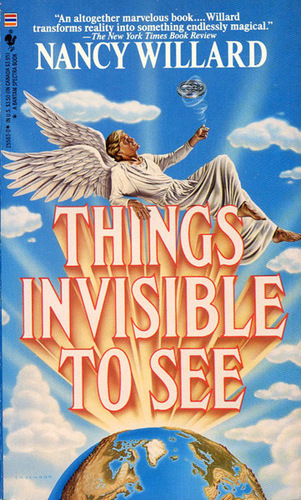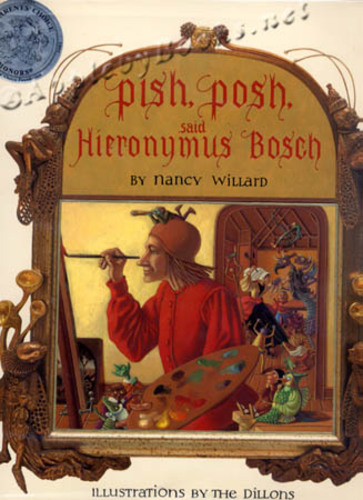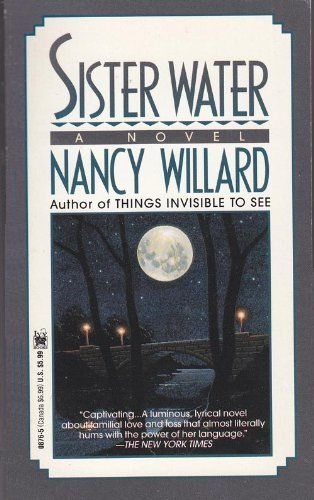Nancy Willard, June 26, 1936 – February 19, 2017
 |
 |
 |
Nancy Willard was the author of more than 70 books, including more than 40 books for children, such as the Anatole trilogy, Firebrat (1988), East of the Sun and West of the Moon: A Play (1989), and Pish, Posh Said Hieronymus Bosch (1991), illustrated by the Dillons. She won the Newbery Award in 1982 for her book of poetry, William Blake’s Inn, illustrated by Alice & Martin Provensen. It was the first book of poetry to win the Newbery.
She also wrote a handful of fantasy novels for adults, including Things Invisible to See (1985), which I bought in Ottawa in the Bantam Spectra paperback edition in 1986 (above left; cover by Todd Schorr). Set in her home town of Ann Arbor in the 1940s, it tells the tale of two brothers who meet a paralyzed young woman, and ends with a baseball game featuring some of the sport’s most famous players. Sister Water (1993) was called “Heavenly…Marvelous… A kind of miracle,” by People magazine (see the back cover of the Wayne State edition here).
Nancy Willard was born on June 26, 1936 in Ann Arbor, Michigan. She earned a Ph.D. at the University of Michigan, and became a professor at Vassar College in Poughkeepsie, New York in 1965. She retired from Vassar in 2013. Her last children’s book will be released this fall. She died peacefully at her home in Poughkeepsie on February 19. She was 80 years old. Read her obituary at the Poughkeepsie Journal.
[…] (6) NANCY WILLARD OBIT. Black Gate reports the passing of author Nancy Willard, June 26, 1936 – February 19, 2017. […]
She was my first and best writing mentor in college. I took every course she taught while I was at Vassar — poetry workshops, children’s lit, and so many others they blur into one big four-year seminar. Her generosity was endless. She hosted us for dinner parties and made sure we remembered what real food was like. Books she thought would interest us appeared mysteriously in our campus mailboxes. She gave me her copies of Poets & Writers (the Locus of poetry and litfic) the moment she was done reading them. She tried to educate me in the business side of writing — which, now that I think of it, was a pretty clear vote of confidence — but I wasn’t ready to learn that part yet. There was even a heroic matchmaking project in which she tried to help me place a children’s book manuscript with her agent and one of her editors, but both of them had emergencies that year, and I didn’t know how to follow up after I graduated. It took me 20 years to get on my own to a place analogous to the one she tried to launch me into.
The obituaries are all doing a fine job of describing her storied writing career, her beautiful books. They don’t convey her personal presence, with its warmth, its light, its flashes of humor and its joyful aesthetic. She had some training as a fine artist, and her every day was her art.
Her house was full of strange and astonishing objects she and her husband made. They kept a life-size sculpture of William Blake permanently seated at their dining room table. His face was a copy of Blake’s real plaster life mask. She’d painted his features with the night sky and clothed him in velvets. With her warm alto laugh, she told all of us students about the time a meter reader came in to check the numbers, took one look at William Blake, and ran for his life.
The Poughkeepsie Journal obituary describes her as “the lady on the bicycle,” but neglects to mention that the bicycle in question was a massive vintage 1950s girl’s bicycle, in Pepto-Bismol pink and of steel that looked to weigh a quarter ton. She must have been far more muscular than she looked. On hot, sunny days, she’d traverse the campus under a hand-pained bamboo and silk parasol. Her sartorial choices put me in mind of a phrase I recently saw used to describe John Lewis at Comic-Con, “cosplaying himself.” Nancy Willard could get away with dressing like a latter-day fairy godmother (sans wings), and carried it off as if it were the most natural thing in the world.
It will surprise no one that she was the only professor among Vassar’s justly vaunted creative writing faculty to welcome students who wrote fantasy. When my senior thesis seminar stuck me with a realistic fiction fundamentalist (“But nobody reads that stuff!”), Willard was my lifeline. I let myself be hounded out of fiction into academia by others, but she never gave up on me.
For all the things I learned while I was with her, others I could only practice to understand. Years later, hundreds of miles away, my memories of her were still teaching me. All the good-teacher characters in my books, all my openhanded-host characters owe something to her. The best self I’m still trying to become, the ideal of the good teacher I strive to be, owes a great deal to her.
Read her novels and poetry, read her picture books to the children in your lives. There’s wonder, joy, laughter, and kindness there. All of it’s real — even William Blake.